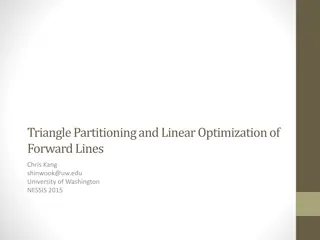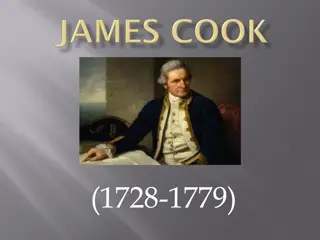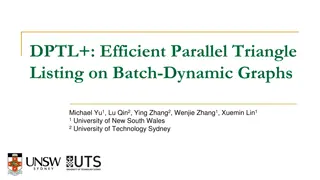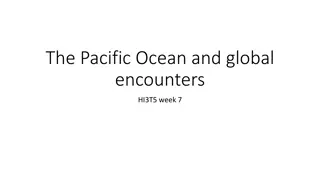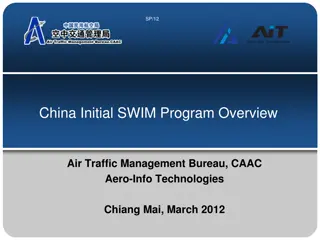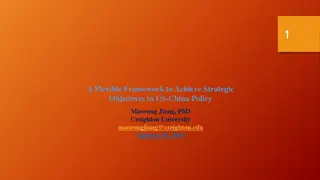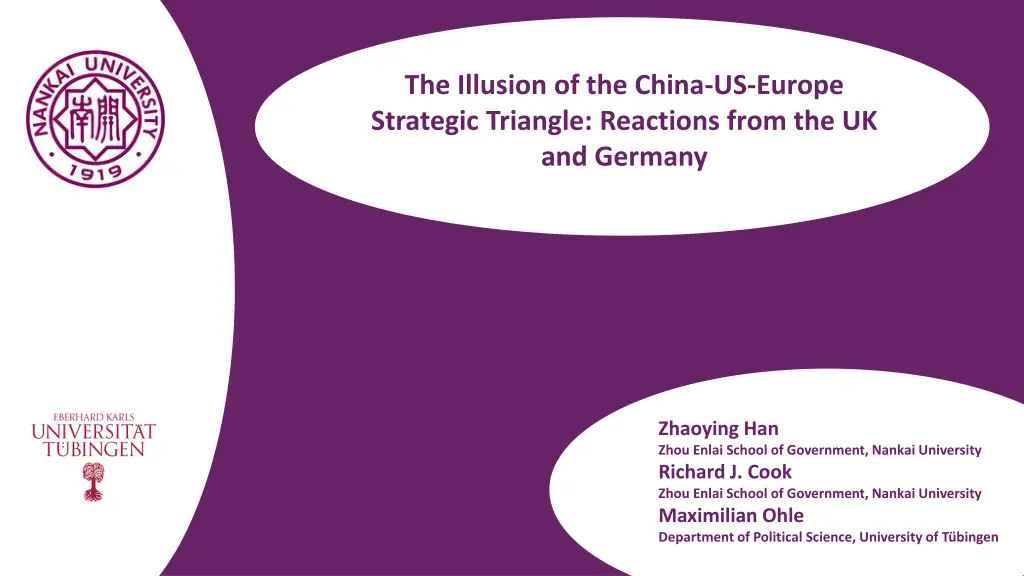
Understanding Europe's Approach to China-US Relations
Explore how Europe, particularly the UK and Germany, navigates its foreign policy towards China amidst the US-China power rivalry. Delve into the concept of strategic independence, hedging strategies, and the implications for the Rules Based International Order (RIO).
Download Presentation

Please find below an Image/Link to download the presentation.
The content on the website is provided AS IS for your information and personal use only. It may not be sold, licensed, or shared on other websites without obtaining consent from the author. If you encounter any issues during the download, it is possible that the publisher has removed the file from their server.
You are allowed to download the files provided on this website for personal or commercial use, subject to the condition that they are used lawfully. All files are the property of their respective owners.
The content on the website is provided AS IS for your information and personal use only. It may not be sold, licensed, or shared on other websites without obtaining consent from the author.
E N D
Presentation Transcript
The Illusion of the China-US-Europe Strategic Triangle: Reactions from the UK and Germany Zhaoying Han Zhou Enlai School of Government, Nankai University Richard J. Cook Zhou Enlai School of Government, Nankai University Maximilian Ohle Department of Political Science, University of T bingen
Objectives 1. 1. Research Question 2. 2. Literature Review 3. 3. Theoretical Framework 4. 4. Case Studies & Analysis 5. 5. Conclusion
1. Research Question Whilst the great power competition between the USA and China is unfolding, there is an on-going debate as to whether Europe can retain a strategically independent position as consequence of avoiding entrapment. Despite the contemporary frictions and dissatisfaction with the Trump administration s aggressive foreign policy signaling, most European states do preserve the traditional normative value canon as the basis for engagement within the Rules Based International Order (RIO). 1. To what extent does the national foreign policy of London and Berlin towards China s order-building projects condition reactions to US (mis-)management of the RIO under the Trump administration?
2. Literature Review Europe, (EU+UK), as an appendage of the US-led liberal hegemonic order based on market economic and democratic principles, shared values and the legal state doctrine (Ikenberry, 2008, 2009; Lundestad, 2012; Nexon and Wright, 2007). This is commonly contrasted to China s developing economically-based international order as an attempt to underpin its ambitions as an order constructor reinforced by idealistic proclamations to induce alignment (Ohle et al., 2020; Yan, 2014; Zhang, 2015). Great power competition, portending an ill-fated zero-sum conflict, framed as the Thucydides Trap (Mearsheimer, 2001; Allison, 2016). Balancing and bandwagoning as traditional conceptual parameters to assess the foreign policy behavior of second-tier and small states (Waltz, 1979; Walt, 1987; Schweller, 1994); hedging as a third category that refers to those caught in the middle and simultaneously seek to minimize the risks and maximize the benefits (Goh, 2009; Liu, 2016). Attempts to contextualize Europe s quest of strategic independence (Leonard and Shapiro, 2019; Lippert et al., 2019; Kempin and Kunz, 2017). However, any attempt of achieving strategic independence would signal the factual relinquishment of the value-based canon that Europe does not seek to abandon. As such, strategic independence is a conceptual oxymoron.
3. Theoretical Framework Hedging as a concept to explain the foreign policy behaviour of European states, in particular the UK and Germany. Balancing: allying with a more powerful state against a common threat (Walt, 1987). Bandwagoning: alignment with the source of danger (Walt, 1987). Hedging as a category to further expand the conceptual scope: set of strategies which cultivate a middle position that forestalls or avoids having to choose one side at the obvious expense of the other (Goh, 2005). Hedging has been mostly applied to Asia-Pacific, whilst research on Europe as a whole or European countries in particular remains largely neglected. Inexplicit strategic hedge as a conceptual attempt to capture the interaction dynamics of European states vis- -vis the USA and China.
4. Analysis: Germany The question as to how to become strategically independent presents an on- going predicament in Germany due to commitments to the US alliance network and economic relations with China based on Wandel durch Handel (Change through trade) This constellation insinuates an inexplicit strategic hedge and strategic ambiguity originating from its quest to benefit from both vectors China wants Europe to become strategically independent, in order to outmanoeuvre the USA by further accommodating Europe and offering vital economic incentives (at least Beijing signals so) No pivot to China verifiable; the contemporary rapprochement between Berlin and Beijing are rather based on a pragmatic approach reinforced by the dissatisfaction with the Trump administration s aggressive signaling As noted by Kissinger, a divided Atlantic would turn Europe into an appendage of Eurasia, which would be at the mercy of a China that wants to restore its role as the Middle Kingdom be the principal adviser to all humanity predicament, as Germany is unable to canalize its leverage into a coherent foreign policy agenda, neither on the national nor on the EU level. Simultaneously, Germany is recognized as one of the target states for the BRI, with Duisburg becoming transformed into a trade hub China not only has become a cooperation partner, but also a competitor and systemic rival due to diverging political and economic governance models Made in China 2025 ; increasing Chinese investments in Germany allegedly coupled with political motives The BDI has raised particular concerns about not only the situation in the Hong Kong SAR and Xinjiang, but also the governmental influence and the pursuit of technological leadership This presents a certain degree of analogy to the foreign policy agenda of the Trump administration Berlin s regional strategy tinkers around the edges of trade policy without risking the cost of a full-fledged strategic reckoning with China (Goldberg, 2020) Machtvergessenheit [i.e. the non-recognition of one s own power capabilities]
4. Analysis: UK While positioned at the end of the line of the BRI s New Eurasian Land Bridge Economic Corridor, the UK is considered a prime target for Beijing s order building strategies Cameron & May --- Golden Era for Sino-US relations --- UK the top destination of investment from China --- UK s part in engagement > Cameron s updated Macmillan Doctrine > liberalize China (failure) + reinvigorate British economy. Increasing securitization and weaponization of Sino-British economic interactions --- Washington (Hinkley Point, Huawei 5G, HS2). Johnson Post-Brexit US Trade deal pressure over potential clauses targeting Sino-British economic ties. Increased signaling rhetoric over issues such as Hong Kong SAR, Xinjiang, digital security. Westminster is leaning east of Suez again (Strike group deployments), bolstering security partnerships with China-concerned actors, e.g. D10 (also members of the RIO). Struggling to form a coherent long-term China policy as its values conforming to RIO standards cash with vested economic interests being sought with China --- Recent re-pivot towards Washington suggests Johnson s administration has emphasised RIO values as critical to his foreign policy outlook, causing friction with Beijing over various issues --- although panda huggers and dragon slayers are jostling for influence over Britain s China Policy. Inexplicit strategic hedge is visible, but to a much more nuanced extent However, London retains desirability in the RIO and US-led hegemony. Displays a dual-vector approach that is under increasing stress from the rippled effects of the developing Sino-US rivalry. UK policy organizers struggle to draw a clear line between strategy discourses and an official diplomatic line Values vs. Interests. Likewise, London is having difficulty coping with good cop-bad cop (status signaling) singals from Beijing. Brexit impact
5. Conclusion Kupchan (2012: 189): It makes little sense for the West to denigrate and ostracize regimes whose cooperation it needs to fashion a secure new order; the stakes are too high. Western countries only harm their own interests when they label as illegitimate governments that are not liberal democracies. Recognizing the next world s inevitable political diversity and thereby consolidating cooperation with rising powers of diverse regime type is far more sensible than insisting on the universality of Western conceptions of legitimacy and alienating potential partners .
5. Conclusion Status quo of instability Coping strategies Dual-track diplomacy It will not have escaped the Chinese leaders that they were received not for their civilization but for, and only for, the weight of their gold (Ringen, 2015). Economic bargains are beginning to spill over into closer political, and to a greater extent, security relations. Both foreign policies towards China s order building projects scarcely condition reactions to the Trump administration s mismanagement of the RIO, as greater emphasis is placed upon policy synergies in the transatlantic partnership, despite a host of issues. The inescapable truth is that while London and Berlin can opt to lean towards Beijing for economic interests, both cannot constitute a reconciliation of values, nor ignore Washington s security concerns.
Thank You! Zhaoying Han Zhou Enlai School of Government, Nankai University Richard J. Cook Zhou Enlai School of Government, Nankai University Maximilian Ohle Department of Political Science, University of T bingen







